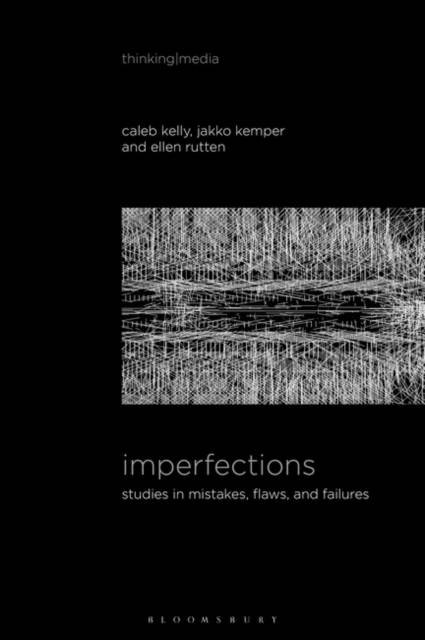
Bedankt voor het vertrouwen het afgelopen jaar! Om jou te bedanken bieden we GRATIS verzending (in België) aan op alles gedurende de hele maand januari.
- Afhalen na 1 uur in een winkel met voorraad
- In januari gratis thuislevering in België
- Ruim aanbod met 7 miljoen producten
Bedankt voor het vertrouwen het afgelopen jaar! Om jou te bedanken bieden we GRATIS verzending (in België) aan op alles gedurende de hele maand januari.
- Afhalen na 1 uur in een winkel met voorraad
- In januari gratis thuislevering in België
- Ruim aanbod met 7 miljoen producten
Zoeken
€ 228,95
+ 457 punten
Omschrijving
This open access book synthesizes the swiftly growing critical scholarship on mistakes, glitches, and other aesthetics and logics of imperfection into the first transdisciplinary, transnational framework of imperfection studies.
In recent years, the trend to present the notion of imperfection as a plus rather than a problem has resonated across a range of social and creative disciplines and a wealth of world localities. As digital tools allow media users to share ever more suave selfies and success stories, psychologists promote 'the gifts of imperfections' and point to perfectionism as a catalyst for rising depression and burnout complaints and suicide rates among millennials. As sound technologies increasingly permit musicians to 'smoothen' their work, composers increasingly praise glitches, noise, and cracks. As genetic engineering upgrades with swift speed, philosophers, marketeers, and physicians plea 'against perfection' and supermarkets successfully advertise 'perfectly imperfect' vegetables. Meanwhile, cultural analysts point at skewed perspectives, blurry images, and other 'deliberate imperfections' in new and historical cinema, painting, photography, music, and literature.
While these and other experts applaud imperfection, scholars in fields ranging from disability studies to tourism critically interrogate a trend to fetishize imperfection and poverty. They rightfully warn against projecting privileged (and, often, emphatically western-biased) feel-good stories onto the less privileged, the distorted, and the frail.
The editors unite the different strands in imperfection thinking across various disciplines tools. In fourteen chapters by experts from different world localities, they offer scholars and students more historically grounded and more critically informed conceptualizations of the imperfect.
This book is available as open access through the Bloomsbury Open programme and is available on www.bloomsburycollections.com.
In recent years, the trend to present the notion of imperfection as a plus rather than a problem has resonated across a range of social and creative disciplines and a wealth of world localities. As digital tools allow media users to share ever more suave selfies and success stories, psychologists promote 'the gifts of imperfections' and point to perfectionism as a catalyst for rising depression and burnout complaints and suicide rates among millennials. As sound technologies increasingly permit musicians to 'smoothen' their work, composers increasingly praise glitches, noise, and cracks. As genetic engineering upgrades with swift speed, philosophers, marketeers, and physicians plea 'against perfection' and supermarkets successfully advertise 'perfectly imperfect' vegetables. Meanwhile, cultural analysts point at skewed perspectives, blurry images, and other 'deliberate imperfections' in new and historical cinema, painting, photography, music, and literature.
While these and other experts applaud imperfection, scholars in fields ranging from disability studies to tourism critically interrogate a trend to fetishize imperfection and poverty. They rightfully warn against projecting privileged (and, often, emphatically western-biased) feel-good stories onto the less privileged, the distorted, and the frail.
The editors unite the different strands in imperfection thinking across various disciplines tools. In fourteen chapters by experts from different world localities, they offer scholars and students more historically grounded and more critically informed conceptualizations of the imperfect.
This book is available as open access through the Bloomsbury Open programme and is available on www.bloomsburycollections.com.
Specificaties
Betrokkenen
- Uitgeverij:
Inhoud
- Aantal bladzijden:
- 344
- Taal:
- Engels
- Reeks:
Eigenschappen
- Productcode (EAN):
- 9781501380341
- Verschijningsdatum:
- 30/12/2021
- Uitvoering:
- Hardcover
- Formaat:
- Genaaid
- Afmetingen:
- 140 mm x 216 mm
- Gewicht:
- 544 g

Alleen bij Standaard Boekhandel
+ 457 punten op je klantenkaart van Standaard Boekhandel
Beoordelingen
We publiceren alleen reviews die voldoen aan de voorwaarden voor reviews. Bekijk onze voorwaarden voor reviews.








